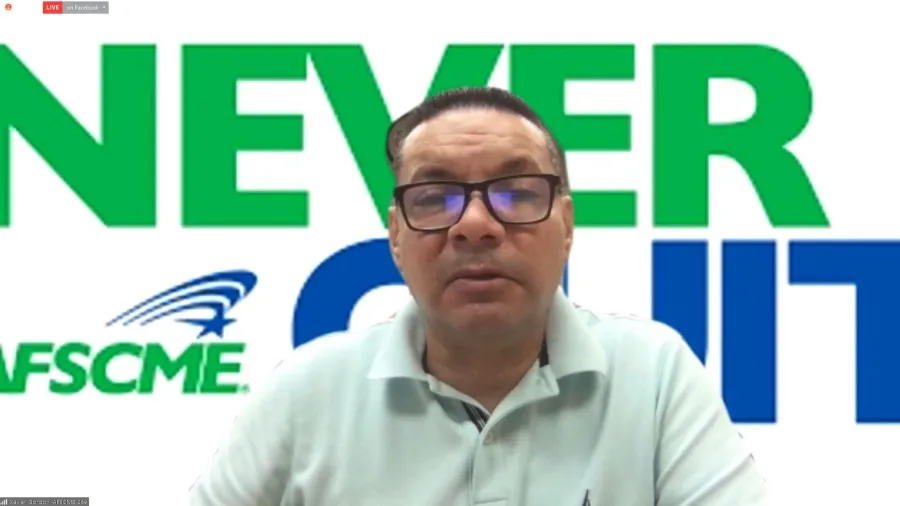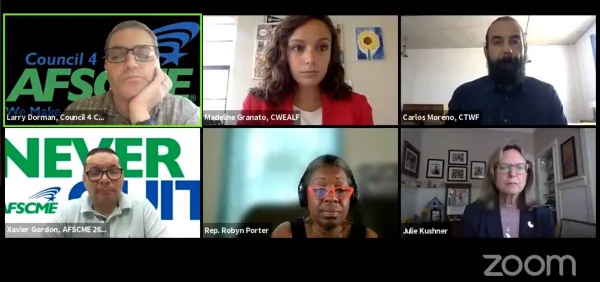Paid Leave Advocates Push Back Against Privatization

On January 1, 2022, Connecticut workers can begin reaping the benefits of Connecticut’s groundbreaking paid family and medical leave program to care for a loved one, or themselves, without having to worry about lost income. That’s welcome news.
But there are clouds on the horizon caused by Gov. Lamont’s insistence on bypassing dedicated, trained state employees to privatize claims administration and then selecting the Aflac insurance company to administer the program.
“We’re deeply concerned by Governor Lamont’s decision to contract out such a critical component of the law to a private entity such as Aflac,” said Madeline Granato, Policy Director for the Connecticut Women’s Education and Legal Fund (CWEALF), speaking at a zoom press conference sponsored by Council 4.
CWEALF is the organizational Chair of the Campaign for Paid Family Leave, a coalition of advocates that fought for and won passage of paid leave legislation in 2019. CWEALF and other advocates who supported the paid leave participated in the press conference to reaffirm their support for the program but also to share concerns over the privatization of claims administration.
The Lamont administration announced the selection of Georgia-based Aflac on July 29. He said the company promised to bring 150 jobs to Windsor, CT in exchange for receiving a three-year, $72 million contract that received no public scrutiny.
Aflac is a Fortune 500 company with a troubling record that includes multiple allegations of mistreating workers while engaging in practices that deceived shareholders and customers. Last year, their CEO took home $22.6 million in salary, or 355 times the median salary of company employees.
“Our members reject the governor’s decision to outsource the administration of the program as the best option,” said AFSCME Local 269 President Xavier Gordon, a career development specialist at the DOL. “Selecting Aflac continues this administration’s pattern of handing out expensive contracts to private companies to perform DOL functions.”
He added, “Paid family and medical leave insurance should be administered by workers who, by career choice and training, are subject matter experts dedicated to protecting the public interest, not to boosting shareholder dividends.”
CT Working Families State Director Carlos Moreno warned that privatizing paid leave could result in lower access to services.
“Public paid leave funds should be available to the greatest degree possible to support families in need, rather than spending any of it on executive pay and shareholder earnings.”
Moreno stressed the PFML program “ideally should have remained in public hands. The administration of the program is so intimately related to the public interest that we expected it would be handled by accountable, trained and experienced public workers. Now, time will tell.”
CWEALF’s Granato echoed that sentiment.
“History and our current systems have shown us that privatizing a public good or service allows companies to deny those same services to individuals and profit from necessities,” she said. “And the individuals who were and are still most likely to be impacted by the pandemic – Black, Hispanic, low-income workers and especially women in our state – are also the most likely to be harmed by the privatization of this benefit.”
Sen. Julie Kushner and Rep. Robyn Porter, co-chairs of the legislature’s Labor Committee who championed the 2019 legislation, said they will be scrutinizing the privatization process carefully.
[caption align="right"]
“We have concerns about privatization,” Kushner said. “We have to examine everything we do to make sure there is no [financial incentive] to deny claims. I want every penny of that that can be spent to go directly to people who are in need of this program.”
Porter said she, too, has “grave concerns around what we see becoming a pattern with the executive branch, where they are privatizing a lot of work that I feel should be [public] agency work. Transparency is desperately needed to make sure the program operates the way it’s supposed to operate.”
Kushner and Porter are hopeful that DOL employees will handle claims administration when the Aflac contract expires.
